#japanese occupation
Text
A lone tomb, a memory of Syonan Shipyard, and their links to Keppel House
Much has been made about the “mysterious” solitary Japanese tomb sitting on the southern slopes of Mount Faber. The tomb, which could be thought of as a memorial to a painful time in Singapore’s history, contains the remains of a member of staff of Mitsubishi Heavy Industries’ (MHI) Kobe shipyard, a naval architect by the name of Komoto Ekasa (or Omoto Egasa). Komoto was among an group of 94 MHI…

View On WordPress
#Architecture#Changing Landscapes#Forgotten Places#Imperial Japanese Navy#Japanese Occupation#Japanese Occupation of Singapore#Japanese Tomb#Keppel Harbour#Keppel Hill#Keppel House#Kobe Shipyard#MHI#Mitsubishi Heavy Industries#Mount Faber#Old Places#Old Singapore#Photographs#Photography#Places of Mystery#Second World War#Shiprepair#Singapore#Singapore Harbour Board#Syonan Shipyard#World War II#World War Two#WW2#WW2 Sites
2 notes
·
View notes
Text
(I intentionally left out many details of her life in this article on purpose.)
My mother-in-law Kazuko passed away on August 18, 2012 11:31 AM
Okinawa is known today as the Hawaii of Asia. As Kazuko's story begins in the days before the Battle of Okinawa. A story about an Okinawan woman who led a quiet life that was anything but that.
Japanese occupation started early for Okinawa (Ryukyu Kingdom). And with the events of WW2 leading up to the American forces getting closer to the Okinawa Islands. The Okinawans were barely surviving the Japanese occupation. And now they began preparing for the coming invasion from the American forces and millions of insects.
The Japanese military had built underground tunnels. Turning Okinawa into a fortified island. All at the expense of the Okinawan people.
Food had been taken by the Japanese soldiers that led to mass starvation. Okinawans who spoke their own language were killed as spies by the Japanese military.
Just before the American bombing began, people fled to the natural underground caves or tried to get off the island. For those that hid in the caves faced many obstacles. Millions of dangerous bugs inhabited these caves. Their bites were so painful that you wished you were dead.
The military worked the Okinawans into hysteria. To commit suicide rather than being captured by the American military. Many did commit suicide but the Japanese military were responsible for it. Kazuko, who was nine at the time, remembers hearing stories of gun fire inside the caves days before the Americans ever came ashore.
She remembers the Japanese military was providing refreshments for everyone in the caves. But as the US military preparedto bomb the island, the Japanese military never showed up. She later learned that those who drank the milk had died.
The US military came ashore as all the Okinawans did everything they were told to do. As everyone left the caves, they were shocked to see the landscape of the island. Trees, towns even the terrain was all gone.
She said it was like a barren wasteland. Covered with so many US military personnel and vehicles everywhere. Ships off in the distance made her think that she would never see her homeland restored again.
Tents were set up for everyone and there were doctors and other medical personnel to help all those injured. My mother-in-law had bite marks on her and the doctors bandaged her up.
She was also given candy by a few of the American soldiers. The military also provided meals for all the Okinawans. To this day the people of Okinawa really love pork and SPAM.
She got sick one day and the military nurses took care of her. She remembers there was plenty of food to eat and everyone took great care of her and other injured and sick people.
A few years after the war ended the US troops continued to stay on the island. Many people from other Asian nations came to help rebuild Okinawa.
In her final years, Kazuko travels were restricted due to health issues with her kidneys. Eventually she had to undergo dialysis. It wasn’t too long afterwards that this led to her death.
While in the hospital one of her granddaughters came to visit as my sister in law was preparing to visit Kazuko at the hospital. Once there Kazuko was starting to slip away.
Kazuko wanted to talk with her other daughters and grandkids. We were called nearly at midnight our time.
Kazuko’s hearing was going as we all had to scream into the speaker phone that we loved her. She finally acknowledged that she heard every one of us. The phone called ended but within two minutes we were called back. Kazuko had passed away.
Many current and former Okinawan government officials came to the funeral. It was a surprise to Kazuko’s family and friends. These officials grew up with Kazuko. They worked tirelessly in the days after WW2 to rebuild Okinawa.
A simple woman who survived many obstacle. Such as going against her doctor’s orders and came to America in 1999 and 2001 to see her newborn grandsons.
The final days of her life was going to the hospital every other day for dialysis treatments. Those treatments had blackened her body due to multiple needle marks.
But in those final moments of her life she was surrounded by her family in person and through cell phones. She died August 18, 2012 11:31 AM Japan time with the sounds of her children and grandchildren all expressing their love for her.
I have just scratched the surface knowing that there is more about her. She was a private woman who kept many things to herself. But I put a part of what I do know to print in the hopes that others can remember her as well.

22 notes
·
View notes
Text
Beyond the vile, beyond the graves
Dedicated to Sir John Audie Cabrera, who taught me to seek the good in life’s adversities.
Blank shots kiss the mourning-tinged air as the ceremonial gun salute bid farewell a man blanketed in the Philippine Flag. Decades later, on his bunso’s casket would drizzle tears with each drop decorated with memories of honorable acts like ornamental globes gently crashing down.
For two days, I have watched “GomBurZa”; The accounts of three secular priests, two of whom fighting for equality extending from friars’ superiority to oppression of the Filipino people, and one among them leading a student protest back in 1860. Their execution made a lasting impact on the national-hero-to-be, Jose Rizal, bestowing El Filibusterismo to the wrongfully accused trio.
In my ongoing two year stay in Metro Manila, I’ve been more captivated by the history of the Philippines. Several nationalistic yet ghastly stories continue to haunt me on my most idyllic hours; Maningning Miclat, Luis Manuel the son of Primitivo Mijares, the Aswang psychological warfare acts of CIA, the horrors of the Japanese occupation, and now, GomBurZa. Sometimes, I would sit and look out on my window and think of how albeit these events happened not even in old antiquity, seems to have been forgotten by today’s citizens. It is disheartening to know that a lot of Filipinos bought us brighter future at the cost of their lives, and yet, our recollections of them are fading.
Then… I remembered people close to my heart.
In the eyes of my eight-year-old self, my dad was an emotionally abusive alcoholic, and my grandfather a wicked authoritative parent who spanked his children.
They said people have different facades, which for me I prefer to call simply their lateral sides; genuine and integral in their whole identity, just strange to what we see deeper at home.
My grandfather was a school principal by profession and was a lieutenant colonel before he was discharged. He was said to have joined the war twice. On his first service he was shot near his heart and was advised to reunite with his family and leave his military life behind. However, as a trait annoyingly prevalent in our blood, he was stubborn and went back. Daddy told me that my grandfather’s troops would find Japanese soldiers’ corpses long cold before being discovered. In their pockets were small guava fruits seemingly their only source of nourishment during the war. They would die of hunger instead of encounters. When they would find Japanese alive, they’ll be too weak and emaciated to fight so they’d surrender them to the Americans instead of killing them. As even the water resources were scarce and polluted, my grandfather was infected by either typhus or typhoid fever and died young. Neighbors told Nanay, my lola, that they saw Tatay’s apparition sitting beside his kids on the front porch. I grew up having his framed bronze star and purple heart certificates permanent on my grandmother’s walls.
Daddy, on the other hand, was a “happy go lucky” man as often described by my mom; a man who “always wore his heart on his sleeves”. At his worst he was an unstable and occasionally suicidal man who would later be the author of my life’s ACOA laundry list.
However, at his best I cannot deny the noble deeds he’s done. In the aftermath of his divorce and halted New Zealand journey, he went back to the Philippines and established EasternTech, the first vocational computer school in our city during the late 1990’s and early 2000’s. One among his students was Kuya Marlon, who waited patiently ‘til dawn during my dad’s wake to bawl his eyes out.
“You promised me we’d be partners again! You told me you were going but I didn’t know it was true!” Reports my aunt who heard his cries.
Kuya Marlon was a semi-orphaned delinquent. His father left them as children, and came back when he was a teen. Upon his hopeful arrival, he promised Kuya Marlon education. Schools wouldn’t accept Kuya Marlon who was stereotypically long haired and reeked of marijuana, until Dad accepted him without judgement. On his second year, final half of the vocational course, his father abandoned them again. With a shattered heart, he told Dad he would be dropping out due to his sudden circumstances. Dad wouldn’t allow him though; he told him not to worry about it and to finish his studies.
Then school secretary was feeding her family through our school’s funds. It would later come to light the unpaid electricity and building rent bills and a neighbor informing of how the sole breadwinner is always taking home expensive takeouts and sending her siblings to school. She was fired but not reported to the police due to my dad’s sympathy.
Unfortunately, it was also during the time that AMA Computer Colleges launched its branch in San Jose City and dad’s paying students transferred. What were left were students who could only give promissory notes. Ultimately, the school went bankrupt hence Dad and his business partner agreed to dissolve. Still, Dad partnered with a local private institution, Bettbien Montessori, to hire his graduates into their schools and so they did.
On Dad’s previous chapters, he would mentor a grad school student and aid him in creating an interactive computer agrarian map for irrigation systems. The student, Engr. Ernesto Ponce, insists on paying for the service, but Dad declined. He would one day become the division manager of NIA UPRIIS Dam and Reservoir Division. Later on, he repaid my Dad by hiring me when I told him I wanted to work during the pandemic instead of waiting for the uncertain board exam schedule.
During dad’s wake, people who I’ve never known would pass by the chapel, see his picture and name, come in and tell us how surprised they are at his sudden death. Then, they’d tell me a story of how helpful he was. His classmates loved him very much and would describe him as the life of the party, and the leader of political arguments who would get into facebook blocking fights as he persuades them why they shouldn’t vote a certain politician. As a child he would sometimes pay me to encode masonic and amaranth documentations of their charitable activities.
Such a bizarre repetition, that my aunts, uncles, and dad collectively felt unloved and abandoned by Tatay, while my me and my siblings grieve the same mishap. Yet, they were heroes of strangers’ lives. At the end of the day, just as I reminisce famous patriotic figures who are strangers to me, so should I treat Tatay and Daddy with the same respect and honor. No song unsung. Right and just.
0 notes
Text

0 notes
Text
Dutch East Indies hostages and the Death candidates.
Between 1816 and 1949, the Dutch East Indies, now Indonesia, was a Dutch colony. Between 1941 and 1945 it was occupied by Japan.
On 19 and 20 July 1940, 231 people who were on leave from the Dutch East Indies in the Netherlands were arrested by the Germans. They were called ‘Indian hostages’. It was in retaliation for the arrest of nearly 2,400 Germans by the Dutch governor-general in the Dutch…
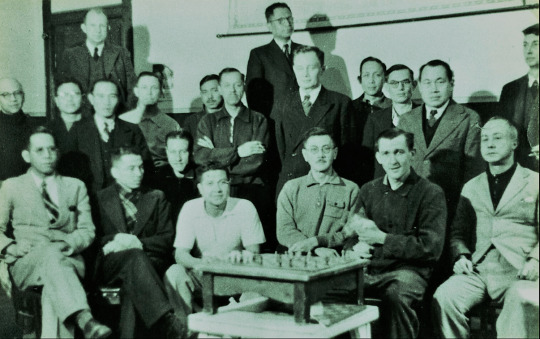
View On WordPress
#Buchenwald#Dutch East Indies#History#Holocaust#hostages#Indonesia#Japanese Occupation#the Netherlands#World War 2
0 notes
Photo
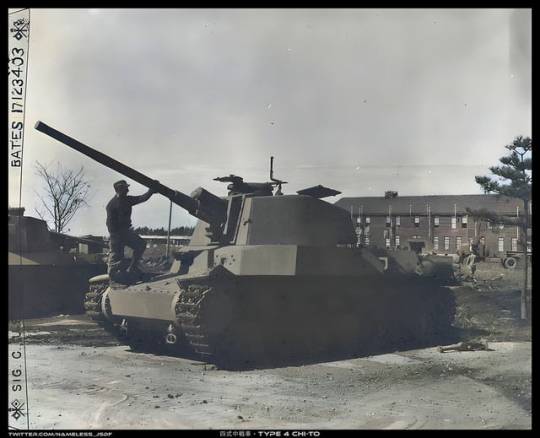
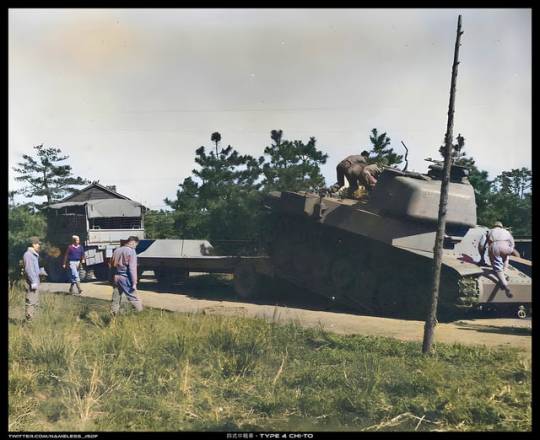


A Japanese Type 4 Chi-To being shipped to the US for evaluation post-war, 1945
115 notes
·
View notes
Text

June 22, 1945
Many Okinawans, like my mother-in-law, were hiding in caves during this time. Constantly being bitten by foot long centipedes. Being worked into a frenzy by the Japanese army. As many committed suicide or unknowingly drank milk laced with cyanide.
My mother-in-law is very lucky to be alive to tell her story. She viewed the Allied invasion as heroes who saved her and her people from Japanese forces.
Japanese forces that forced starvation onto Okinawans. Murdered Okinawans who spoke their language. Forced Okinawan women to sexually satisfy Japanese soldiers (comfort women - google it)
0 notes
Text
I'm reading a collection of tales recounting the early days of the Yokohama Foreign Settlement (Suribachi City, in bsd-verse), and the sheer amount of shenanigans deserves a list but I don't even know where to begin.
The noodle-makers' dispute over flour that led to the Governor of Kanagawa Prefecture committing seppuku? The Japanese-government sponsored brothel with a moat? The two-sword wielding assassins in the swamp who kept killing foreigners? That the foreigners still went bird hunting in the swamp filled with two-sword wielding assassins? The Japanese soldiers quartered nearby bonding with the troops England sent to do something about the two-sword wielding assassins? The English merchant who had his American assistant illegally arrested resulting in a lawsuit against the English merchant in the English court that had to be litigated by the American Consul since he was the only American lawyer in Yokohama, during the course of which the salty editor of an English newspaper decided to settle a personal vendetta by publishing remarks about the American assistant so scathing that the American assistant then hid in wait only to pop out and horsewhip the editor in front of God and everyone, resulting in another trial, but this time in the American court, which meant the American Consul became the judge, a position which he used to imply the English lawyer, the now-judge's former opposing counsel, was worth a sum of 6 1/4 cents, with such insinuation sparking community-wide protests? Blood Town?
#bsd#bungo stray dogs#yokohama#bsd meta#this book was written by an Australian occupation soldier in 1958 who collected tales and histories of the japanese foreign settlements#so take EVERYTHING with a grain of salt#this isnt even all of it#i just dont know how to succinctly explain the chit system or the racket with chinese smugglers#or the caste system developed when they finally filled the swamp#presumably after dealing with the assassin infestation??? unclear.#there may have been assassins in the suburbs#this was JUST in yokohama#the europeans and americans were. acting unwise.
17 notes
·
View notes
Text
stumbled upon this white girl complaining about how the handmaiden doesn't pass the bechdel test like why do you people not have an ounce of critical thought I swear
#yes it has the flaw of being made by a man but like I thought we discussed the issues with the bechdel test already#also why do these people keep throwing around the term infantilizing with this film#yes it has its flaws no it is not infantilizing???#it's set in Korea during the Japanese Occupation ofc it's gonna be uncomfortable you daft fucks
104 notes
·
View notes
Text
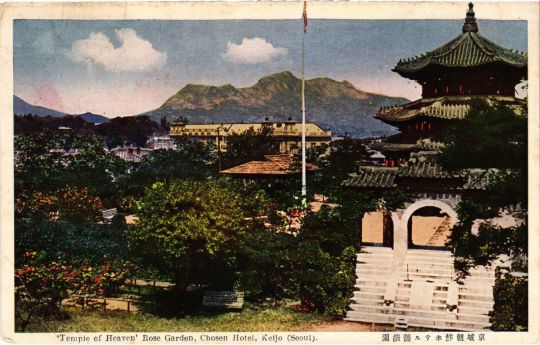
Temple of Heaven's rose garden and Chosen Hotel in Seoul, South Korea, during the Japanese occupation
Japanese vintage postcard, mailed in 1924 to San Francisco
#old#postcard#south korea#korea#postkaart#garden#japanese#vintage#briefkaart#san francisco#postal#ansichtskarte#temple#ephemera#chosen hotel#photography#south#occupation#san#photo#seoul#francisco#postkarte#tarjeta#mailed#chosen#hotel#heaven#historic#sepia
12 notes
·
View notes
Text
Translation Tuesdays: Mater 2-10, by Hwang Sok-yong
Mater 2-10, by Hwang Sok-yong, chronicles Jino’s sit-in, weaving together Korean history and Jino’s family history into a multi-generational saga.
Via
A series dedicated to literature in translation whether classic or contemporary.
Translated by Sora Kim-Russell & Youngjae Josephine Bae
Originally published by Changbi Publishers (2020)
Scribe (2023)
“When nine-tenths of Africa had been seized (by 1900), when the whole world had been divided up, there was inevitably ushered in the era of monopoly possession of colonies and,…
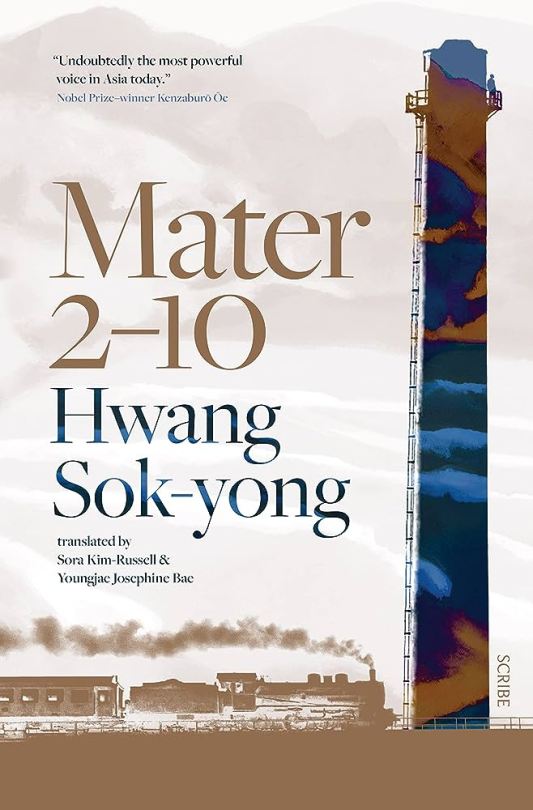
View On WordPress
#asia#book#book reviews#capitalism#colonialism#communism#Dune#economics#exploitation#fiction#Hwang Sok-yang#imperialism#Japanese Empire#Japanese occupation#KLit#Korea#Korean Literature#Korean War#langfocus#language#Lenin#Marxism#Mater 2-10#politics#Scribe#Sora Kim-Russell#translation#Translation Tuesdays#world war 2#Youngjae Josephine Bae
0 notes
Text
at church reading the hymn lyrics like "hey i learned that word from genshin!" and "hey i learned that word from genshin!" and "hey i learned that word from translating song lyrics so that i could write genshin fic!" and "hey i learned that word from genshin!" and finally "omg i learned that word from the king's avatar"
#花話#it's funny bc i Objectively know more cn than the last time i was here seven years ago which is great#bc the last time i learned any cn in a classroom was seven years ago lol#and i think that's probably a combination of Very Much Not Wanting To Lose What Skills I Have +gnshn n similar giving me occasional practice#but yeah of the words i Remember where i learned them it's like 85% gnshn 14% lyric translation n 1% king's avatar lmao#been trying to connect my laptop to the mobile hotspot i have here and Suffering(tm)... pain and agonie#i mentioned this on main but apparently i just Cannot have a line acct for w/e reason#(i suspect it's bc i made an acct in america on my phone number but temp sim card --> diff phone number here)#(and since i didn't expect this i didn't tie the acct to an email --> i am unable to have line)#however my mother and i have graduated past emails and are now just using regular texting to communicate it seems#ANYWAY i get to see the jade cabbage today. i hope. and other things i also hope!!#i was going somewhere w/the line thing OH it's bc on the way home from church my mom saw a sign that said 元氣 and was like 'genki desu!'#it is always kind of a surprise to hear my mom speak jp bc it sounds simultaneously clumsy and full of confidence#she has friends in japan (college roommate + old pen pal + i have no idea she's lived Quite a life i feel) n i once found her old letters#and was kind of surprised bc they were like entirely in jp so obviously she could read n understand a lot#but anyway my mom went on to talk abt how taiwan continues to have significant japanese influence to this day n i was like yes... weebs c':#it's also interesting bc we'll go sightseeing n she'll be like “ye that's from american/jp occupation times but they gave back the land'#'so now it's xyz' n i'll be like. almost 'tails.jpg A Colonialism.'
7 notes
·
View notes
Text
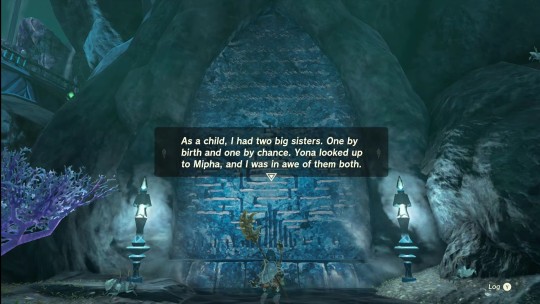
now. why would you make him say that.
#context for 💕kate💕 in case u see this: yona is his fiancee#every time i remember anything about this stupid game i get annoyed but whipping out the history textbook and flipping to the japanese#occupation during ww2 and talking about how it might not be such a good idea to make a main plot point about swearing fealty to a god-king#who wants to 'unify' everyone seems a bit. y'know. intense so we'll complain about silly things instead#totk critical#freya talks loz
11 notes
·
View notes
Text
I finished Whale Star. Man... I knew that it was a little mermaid retelling, and it wasn't gonna be a happy ending, but it was still so sad to reach the end and see it happen. I am really impressed with how the author pulled off a historical fiction fairy tale retelling, and especially how it translated at the end. I was really curious how the mermaid sacrificing herself for the prince would play out, and it did not disappoint.
I don't like historical fiction generally, but I really enjoyed this one because of the little mermaid parallels. I would be willing to read more historical fiction if it was written as a fairy tale retelling.
#i now know more about the Japanese occupation of Korea in the 1920s than i every learned in school#the foot notes were very helpful#fairytales#fairy tales#historical fiction#webtoons#whale star: the gyeongseong mermaid#whale star#fairy tale retellings#reading rat
13 notes
·
View notes